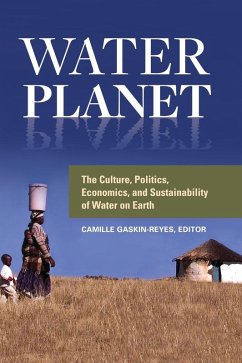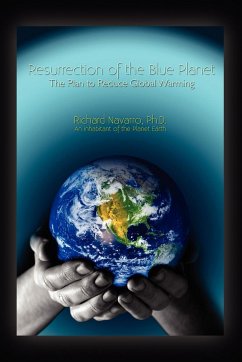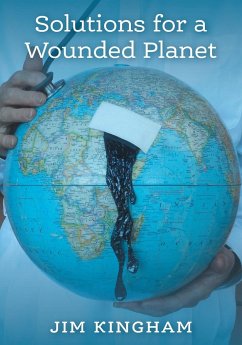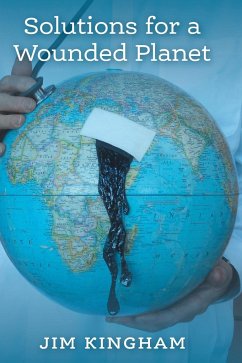Water Planet
The Culture, Politics, Economics, and Sustainability of Water on Earth
Herausgeber: Gaskin-Reyes, Camille
Water Planet
The Culture, Politics, Economics, and Sustainability of Water on Earth
Herausgeber: Gaskin-Reyes, Camille
- Gebundenes Buch
- Merkliste
- Auf die Merkliste
- Bewerten Bewerten
- Teilen
- Produkt teilen
- Produkterinnerung
- Produkterinnerung
Through case studies, opposing viewpoints, and primary documents, this reference work examines the environmental and sustainability issues regarding water as well as how water is an intrinsic part of human culture. Every culture and ecosystem on earth depends on water. As the world's climate changes, human culture is increasingly threatened by the seemingly opposite problems of having too little clean, potable water and "having too much water"-e.g., flooding, melting polar ice caps, and rising sea levels. What are the solutions that humanity must collectively pursue to protect our ability to…mehr
![Resurrection of the Blue Planet Resurrection of the Blue Planet]() Richard Ph. D. NavarroResurrection of the Blue Planet15,99 €
Richard Ph. D. NavarroResurrection of the Blue Planet15,99 €![Solutions for a Wounded Planet Solutions for a Wounded Planet]() Jim KinghamSolutions for a Wounded Planet18,99 €
Jim KinghamSolutions for a Wounded Planet18,99 €![Solutions for a Wounded Planet Solutions for a Wounded Planet]() Jim KinghamSolutions for a Wounded Planet26,99 €
Jim KinghamSolutions for a Wounded Planet26,99 €![7 Steps to End War & Save the Planet 7 Steps to End War & Save the Planet]() Steve Ratzlaff7 Steps to End War & Save the Planet18,99 €
Steve Ratzlaff7 Steps to End War & Save the Planet18,99 €![Person/Planet Person/Planet]() Theodore RoszakPerson/Planet28,99 €
Theodore RoszakPerson/Planet28,99 €![If You Love This Planet If You Love This Planet]() Helen CaldicottIf You Love This Planet16,99 €
Helen CaldicottIf You Love This Planet16,99 €![Poems to Save Our Planet Poems to Save Our Planet]() Anson Primary SchoolPoems to Save Our Planet15,99 €
Anson Primary SchoolPoems to Save Our Planet15,99 €-
-
-
- Produktdetails
- Verlag: Bloomsbury 3PL
- Seitenzahl: 472
- Erscheinungstermin: 31. Oktober 2016
- Englisch
- Abmessung: 260mm x 183mm x 30mm
- Gewicht: 1077g
- ISBN-13: 9781440838163
- ISBN-10: 144083816X
- Artikelnr.: 44707460
- Verlag: Bloomsbury 3PL
- Seitenzahl: 472
- Erscheinungstermin: 31. Oktober 2016
- Englisch
- Abmessung: 260mm x 183mm x 30mm
- Gewicht: 1077g
- ISBN-13: 9781440838163
- ISBN-10: 144083816X
- Artikelnr.: 44707460
Studies 1. Small, Vulnerable Islands: Fallout of Climate Change 2. Climate
Change Adaptation Measures in Developed Countries 3. Impacts of Climate
Change on European Lakes Annotated Document Intergovernmental Panel on
Climate Change (IPCC) Fifth Report 2014: Summary for Policymakers (PM)
Perspectives Should Developed Countries Pay Monetary Reparation for the
Ecological Debt Caused by Their Fossil Fuel Emissions? Chapter 2: Global
Water Cycle Disruptions and Intense Weather Events Overview Case Studies 1.
Old and New Dust Bowls 2. Hurricanes and Intense Storms 3. Water Issues in
China and Neighboring Countries Annotated Document United Nations
Convention to Combat Desertification in the Countries Experiencing Serious
Drought and/or Desertification, Particularly in Africa (1994) Perspectives
Are Levees the Best Long-Term Solution to Protecting New Orleans from
Flooding? Chapter 3: Sharing Freshwater: Cooperation or Conflict? Overview
Case Studies 1. The Impact of Pollution in a Multicountry Lake: A Case
Study of Lake Victoria in the Ugandan Context 2. The Lempa River Basin in
Central America: Water as a Regional Public Good 3. Middle East Water: A
Bone of Contention Annotated Document 2008 Draft Articles of the United
Nations on the Law of Transboundary Aquifers Perspectives How Should the
Colorado River Basin Be Managed to Mitigate Interstate Conflict? Chapter 4:
Ocean and Coastal Environments Overview Case Studies 1. The Exxon Valdez
Spill 2. Threats to the Galapagos Islands 3. Plastic Contamination of the
Ocean: The Great Pacific Garbage Patch Annotated Document United Nations
Convention on the Law of the Sea: Part V: Exclusive Economic Zone
Perspectives Will the Drilling of Oil in the Gulf of Mexico Be a Source of
Regional Conflict between Domestic Stakeholders in the United States?
Chapter 5: Water Governance and Conflicts Overview Case Studies 1. Water
Diversions, Rain Shortages Dry Up a Major Iranian Lake 2. Illicit
Trafficking of People and Products on the High Seas 3. Whaling Conflicts
between Japan and Australia at the International Court of Justice Annotated
Document Berlin Rules: Principles of International Law Governing the
Management of All Waters Perspectives Could Conflicts over Water Actually
Promote Peace and Stability? Chapter 6: Water as the Basis for Social and
Economic Life Overview Case Studies 1. Cochabamba Water for Sale? 2.
Cutting through the Oceans: The Panama Canal and the Proposed Nicaragua
Canal 3. Waterborne Diseases and Human Development Annotated Document The
Dublin Statement on Water and Sustainable Development (1992) Perspectives
What Steps Should Be Taken to Help Provide Access to Clean Water for More
People in the World? Chapter 7: Water, Human Settlements, and the Growth of
Cities Overview Case Studies 1. Cities and LEED Building Technologies 2.
Mexico City: A Water-Stressed Metropolis 3. Water Stress in African Cities
Annotated Document UN-Habitat: Global Water Operators' Partnership Alliance
(GWOPA): GWOPA Strategy 2013-2017 Perspectives What Steps Should California
Take to Deal with Its Ongoing Water Management Issues? Chapter 8: Water,
Ocean Exploration, and Land Grabs Overview Case Studies 1. Medieval
Navigation Devices 2. Muslim Exploration 3. Chinese Exploration Annotated
Document Diego Gutiérrez's 1562 Map of America from the Library of
Congress, Washington, D.C. Perspectives Did Early Polynesians Deliberately
Travel Great Distances to Colonize Pacific Islands? Chapter 9: Water and
Energy Overview Case Studies 1. The Clean Energy Poverty Market: The Case
of Chiapas, Mexico 2. Geothermal Energy 3. Environmental Impact
Assessments: Theory and Practice and the Ilisu Dam and HEPP Hydroelectric
Project in Turkey Annotated Document The 2000 Report of the World
Commission on Dams: "Dams and Development: A New Framework for
Decision-Making" Perspectives How Will the Grand Ethiopian Renaissance Dam
Affect Peace in the Region? Chapter 10: Water and Culture Overview Case
Studies 1. Creation Myths in Different Cultures 2. Water in Abrahamic
Religions 3. Water in Other World Religions Annotated Document River Ganga
at a Glance: Identification of Issues and Priority Actions for Restoration
(2010) Perspectives Should Cultural Exceptions Be Made in Whaling Laws?
Chapter 11: Water and Gender Overview Case Studies 1. Water and Gender in
Madagascar 2. Women's Participation in Shrimp Farming in Asia 3. Women
Explorers and Pacesetters Annotated Document Mainstreaming Gender in Water
Management, UNDP Resource Guide (2006) Perspectives Which of the Following
Development Aid Projects Have Been Most Effective in Incorporating Gender
Considerations into Water and Sanitation Projects to Achieve Intended
Outcomes? Chapter 12: A Time for Change and a Call to Action Overview Water
Initiatives and International Efforts The Pacific Institute for Studies in
Development, Environment, and Security Climate Action Network United
Nations Framework Convention on Climate Change WaterAid Charity Water Women
for Water Partnership (WfWP) Global Activities of the World Bank and
Regional Development Banks Work of Regional Development Banks Outlook and a
Call to Action Annotated Document Conference of the Parties Twenty-First
Session Paris, COP 21, November 30-December 11, 2015: Adoption of the
Convention Applicable to All Parties, Agenda Item 4(b) Bibliography About
the Editor and Contributors Index
Studies 1. Small, Vulnerable Islands: Fallout of Climate Change 2. Climate
Change Adaptation Measures in Developed Countries 3. Impacts of Climate
Change on European Lakes Annotated Document Intergovernmental Panel on
Climate Change (IPCC) Fifth Report 2014: Summary for Policymakers (PM)
Perspectives Should Developed Countries Pay Monetary Reparation for the
Ecological Debt Caused by Their Fossil Fuel Emissions? Chapter 2: Global
Water Cycle Disruptions and Intense Weather Events Overview Case Studies 1.
Old and New Dust Bowls 2. Hurricanes and Intense Storms 3. Water Issues in
China and Neighboring Countries Annotated Document United Nations
Convention to Combat Desertification in the Countries Experiencing Serious
Drought and/or Desertification, Particularly in Africa (1994) Perspectives
Are Levees the Best Long-Term Solution to Protecting New Orleans from
Flooding? Chapter 3: Sharing Freshwater: Cooperation or Conflict? Overview
Case Studies 1. The Impact of Pollution in a Multicountry Lake: A Case
Study of Lake Victoria in the Ugandan Context 2. The Lempa River Basin in
Central America: Water as a Regional Public Good 3. Middle East Water: A
Bone of Contention Annotated Document 2008 Draft Articles of the United
Nations on the Law of Transboundary Aquifers Perspectives How Should the
Colorado River Basin Be Managed to Mitigate Interstate Conflict? Chapter 4:
Ocean and Coastal Environments Overview Case Studies 1. The Exxon Valdez
Spill 2. Threats to the Galapagos Islands 3. Plastic Contamination of the
Ocean: The Great Pacific Garbage Patch Annotated Document United Nations
Convention on the Law of the Sea: Part V: Exclusive Economic Zone
Perspectives Will the Drilling of Oil in the Gulf of Mexico Be a Source of
Regional Conflict between Domestic Stakeholders in the United States?
Chapter 5: Water Governance and Conflicts Overview Case Studies 1. Water
Diversions, Rain Shortages Dry Up a Major Iranian Lake 2. Illicit
Trafficking of People and Products on the High Seas 3. Whaling Conflicts
between Japan and Australia at the International Court of Justice Annotated
Document Berlin Rules: Principles of International Law Governing the
Management of All Waters Perspectives Could Conflicts over Water Actually
Promote Peace and Stability? Chapter 6: Water as the Basis for Social and
Economic Life Overview Case Studies 1. Cochabamba Water for Sale? 2.
Cutting through the Oceans: The Panama Canal and the Proposed Nicaragua
Canal 3. Waterborne Diseases and Human Development Annotated Document The
Dublin Statement on Water and Sustainable Development (1992) Perspectives
What Steps Should Be Taken to Help Provide Access to Clean Water for More
People in the World? Chapter 7: Water, Human Settlements, and the Growth of
Cities Overview Case Studies 1. Cities and LEED Building Technologies 2.
Mexico City: A Water-Stressed Metropolis 3. Water Stress in African Cities
Annotated Document UN-Habitat: Global Water Operators' Partnership Alliance
(GWOPA): GWOPA Strategy 2013-2017 Perspectives What Steps Should California
Take to Deal with Its Ongoing Water Management Issues? Chapter 8: Water,
Ocean Exploration, and Land Grabs Overview Case Studies 1. Medieval
Navigation Devices 2. Muslim Exploration 3. Chinese Exploration Annotated
Document Diego Gutiérrez's 1562 Map of America from the Library of
Congress, Washington, D.C. Perspectives Did Early Polynesians Deliberately
Travel Great Distances to Colonize Pacific Islands? Chapter 9: Water and
Energy Overview Case Studies 1. The Clean Energy Poverty Market: The Case
of Chiapas, Mexico 2. Geothermal Energy 3. Environmental Impact
Assessments: Theory and Practice and the Ilisu Dam and HEPP Hydroelectric
Project in Turkey Annotated Document The 2000 Report of the World
Commission on Dams: "Dams and Development: A New Framework for
Decision-Making" Perspectives How Will the Grand Ethiopian Renaissance Dam
Affect Peace in the Region? Chapter 10: Water and Culture Overview Case
Studies 1. Creation Myths in Different Cultures 2. Water in Abrahamic
Religions 3. Water in Other World Religions Annotated Document River Ganga
at a Glance: Identification of Issues and Priority Actions for Restoration
(2010) Perspectives Should Cultural Exceptions Be Made in Whaling Laws?
Chapter 11: Water and Gender Overview Case Studies 1. Water and Gender in
Madagascar 2. Women's Participation in Shrimp Farming in Asia 3. Women
Explorers and Pacesetters Annotated Document Mainstreaming Gender in Water
Management, UNDP Resource Guide (2006) Perspectives Which of the Following
Development Aid Projects Have Been Most Effective in Incorporating Gender
Considerations into Water and Sanitation Projects to Achieve Intended
Outcomes? Chapter 12: A Time for Change and a Call to Action Overview Water
Initiatives and International Efforts The Pacific Institute for Studies in
Development, Environment, and Security Climate Action Network United
Nations Framework Convention on Climate Change WaterAid Charity Water Women
for Water Partnership (WfWP) Global Activities of the World Bank and
Regional Development Banks Work of Regional Development Banks Outlook and a
Call to Action Annotated Document Conference of the Parties Twenty-First
Session Paris, COP 21, November 30-December 11, 2015: Adoption of the
Convention Applicable to All Parties, Agenda Item 4(b) Bibliography About
the Editor and Contributors Index








